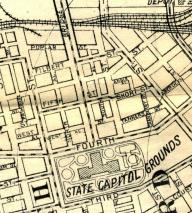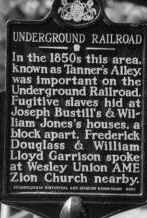|
 
|
Rising
Free
African
American History
in South Central
Pennsylvania:
the 19th Century
|
Harrisburg's Role on the
Trail to Freedom ~ part 1
by T. R. McIntosh
Harrisburg, Pennsylvania, February 2002
|
T. R.
McIntosh --"Mac"-- taught
in the Harrisburg School District for more than forty years before his
recent retirement. Decrying the lack of references to ethnic minorities and
women in his school social studies texts, Mac supplemented his teachings
with material from his extensive reference collection. The following
reference article was produced as a supplement to his session on
Harrisburg's developing anti-slavery role at the February 2002 Underground
Railroad and Abolition Seminars at Gettysburg, Pennsylvania.
|
Significant Dates
- 1775
- Manumission Society (later Pennsylvania Abolition Society) founded, mostly by Quakers.
- 1780
- Pennsylvania General Assembly commits the state to the eventual abolition of slavery in this state.
- 1787
- Pennsylvania Abolition Society asks Benjamin Franklin, Delegate to the Constitutional Convention, to include abolition of the slave trade in the new Constitution.
- 1788
- New Constitution includes three references to slavery:
"Three-fifths" compromise, end of the slave trade by 1808, fugitive slave return provision.
- 1790
- First U.S. Census figures:
State listed about 10,000 Negroes, about one-fourth free
Philadelphia listed 1630 Negroes, only 210 slaves
- 1810-1850
- Estimated 100,000 slaves escaped on the Underground Railroad.
Estimated value of $30,000,000.
Included Harriet Tubman, famous Conductor, who made 19 trips to the South and aided more than 300 slaves to escape, including her mother and father.
- 1816
- Foundation of the American Colonization Society to deport freed American slaves to Africa. Eventually led to the foundation of Liberia in Africa.
- 1830
- William Lloyd Garrison lectured in Philadelphia and engendered strong Abolitionist movement.
- 1832-1849
- Five anti-Negro riots in Philadelphia to oppose and protest Abolitionist movement.
- 1833
- Foundation of American Anti-Slavery Society and Philadelphia Female Anti-Slavery Society.
- 1836
- Beginning of anti-slavery newspaper, known as National Enquirer and Constitutional Advocate of Universal Liberty in Philadelphia, patterned after The Liberator, founded in Boston in 1831 by William Lloyd Garrison. Title converted to Pennsylvania Freeman in 1838 when James Greenleaf Whittier became the editor.
- 1837
- Convention in Harrisburg to organize the Pennsylvania Anti-Slavery Society.
- 1838
- Burning of Pennsylvania Hall in Philadelphia, erected by Abolitionists (Black and White, male and female), only four days after it was opened.
- 1840
- Foundation of Liberty Party to oppose slavery. Ran candidates in elections until disbanded in 1847.
- 1847
- Frederick Douglass and William Lloyd Garrison lectured in Harrisburg and received a rather rough reception.
- 1850
- The Federal Fugitive Slave Law polarized the Pro-Slavery and Anti-Slavery factions in the United States and was one of the steps toward the terrible Civil War.
Go to:
Significant Dates for Harrisburg and Dauphin County (part 2)
Bibliography on Pennsylvania African-American History
Bibliography on Harrisburg & Dauphin County |
Afrolumens Project Home | Enslavement | Underground Railroad |
19th Century|
20th Century
Original material on this page copyright 2003-2004 Afrolumens Project
|
